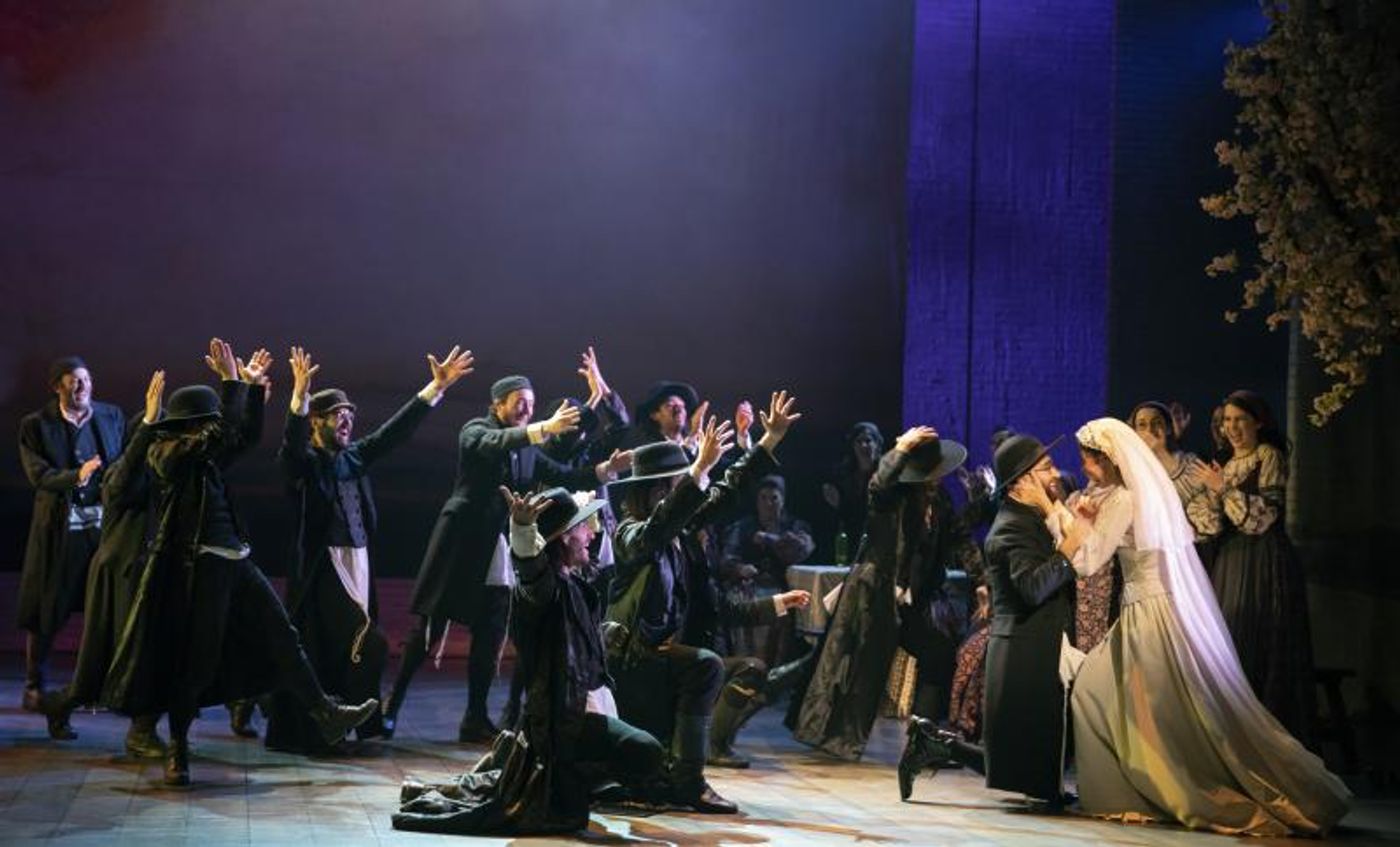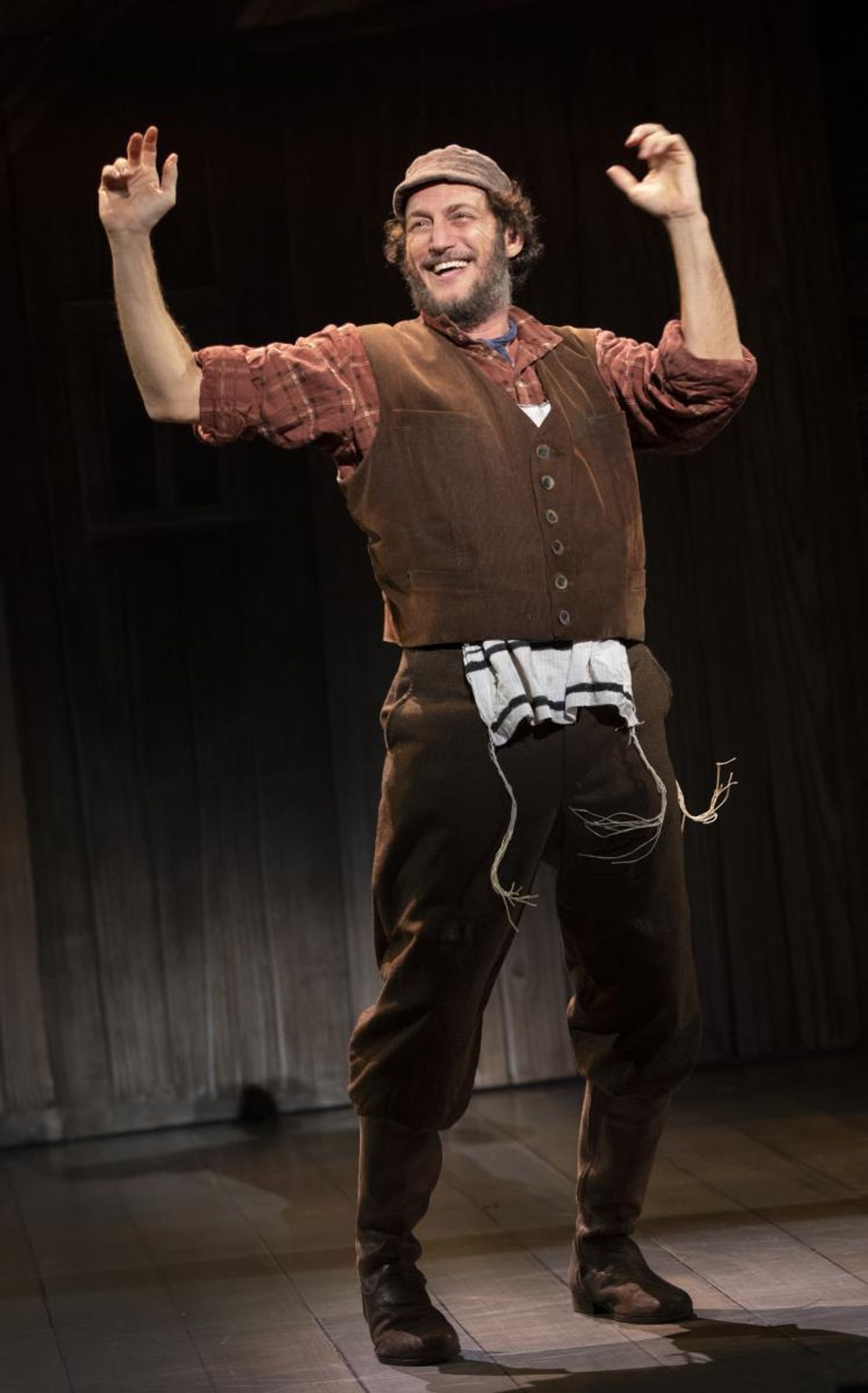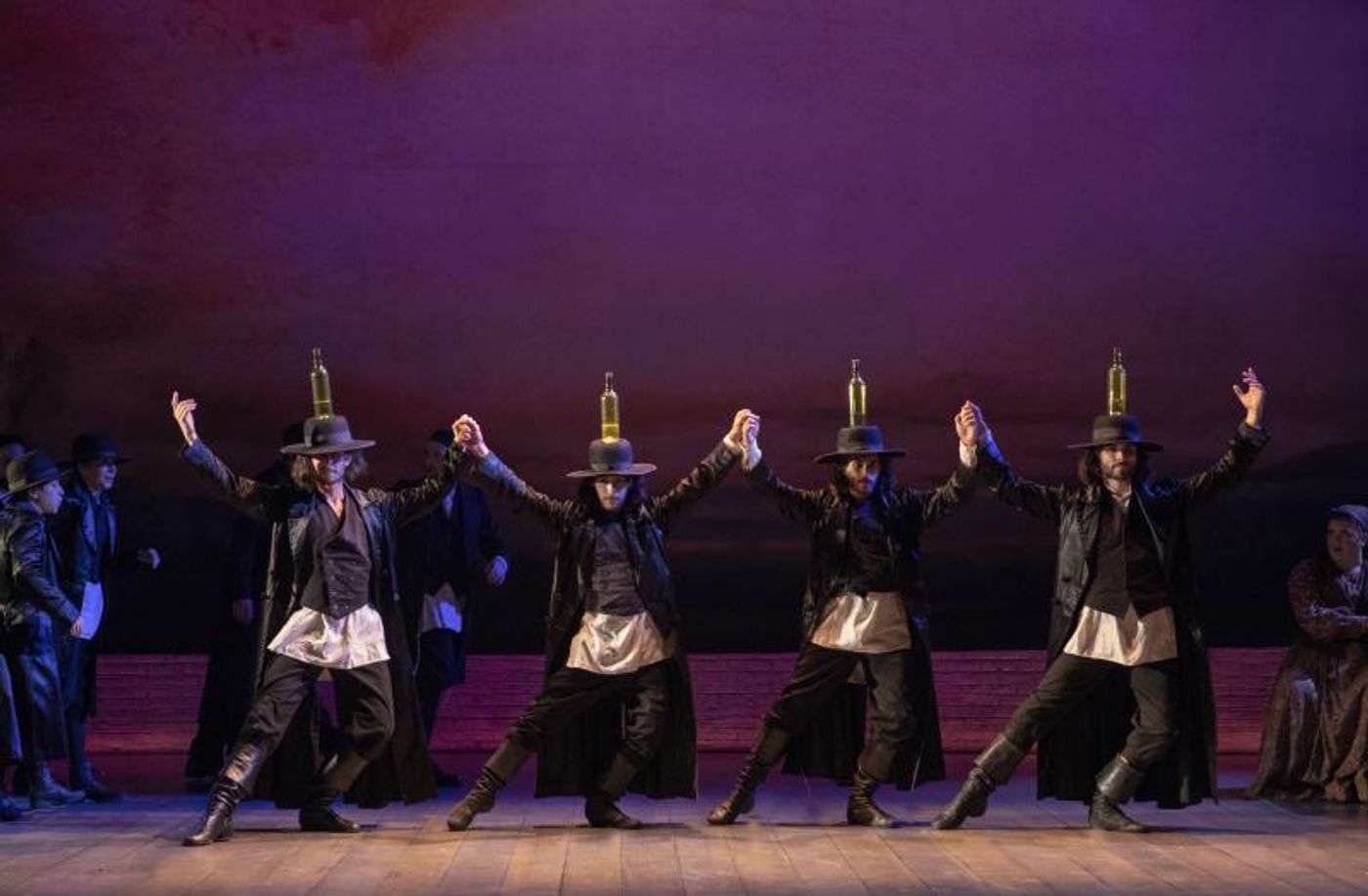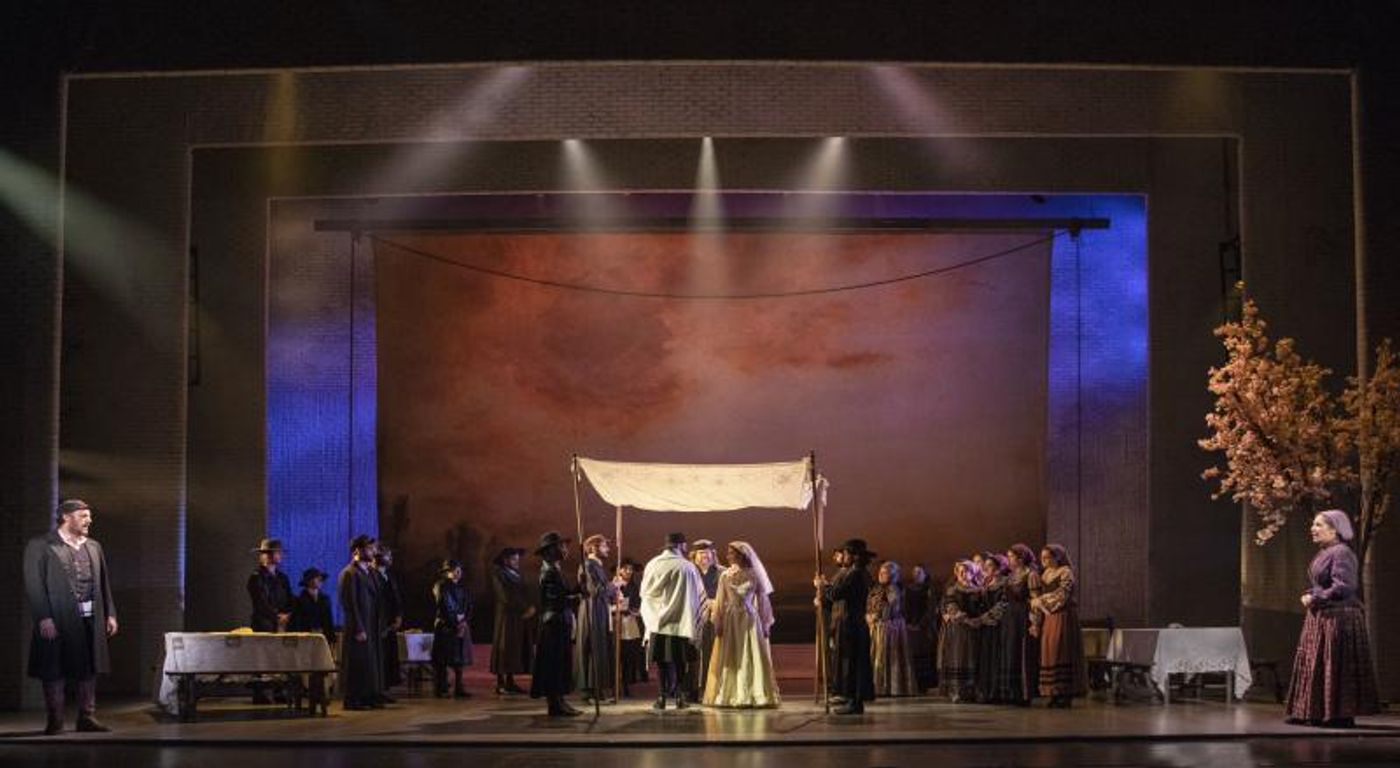Review: Latest Revival of Musical Classic FIDDLER ON THE ROOF Rises at OC's Segerstrom Center

Almost exactly 10 years ago on this very same stage--coincidentally as one of my first assignments for BroadwayWorld--I reviewed what was then the latest touring version of the 1964 Tony Award-winning Broadway classic FIDDLER ON THE ROOF, the ubiquitous musical based on stories written by Sholom Aleichem and featuring music by Jerry Bock, lyrics by Sheldon Harnick, and a book by Joseph Stein.
That production's brief stop at Segerstrom Center for the Arts (then known as the Orange County Performing Arts Center) in the Summer of 2009 was headlined by then 73-year-old actor Chaim Topol, who besides receiving an Academy Award nomination for playing the same lead character Tevye, in the show's 1971 feature film adaptation directed by Norman Jewison, he was also noted to have played the role the most times across various stage productions all over the world, beginning with the 1967 London Production then later, even getting a Lead Actor Tony Award nomination for the show's 1990 Broadway revival.
In the latest North American touring production of what continues to be one of Broadway's laudable theatrical staples, Tevye--the poor, but witty Jewish milkman at the center of the show's story of family traditions and its shaky relationship with a changing world--is now being played by Israeli-born actor Yehezkel Lazarov, who gives the iconic role a fresh, less geriatric delivery that still shines with old-world charm, nuanced depth, and a down-to-earth, relatable persona.

Lazarov--who leads this touring non-Equity iteration of the Bartlett Sher-directed 2015 Broadway revival--provides just one of the many reasons to reacquaint yourself with this enduring stage classic, now finishing up its limited engagement at Segerstrom Center for the Arts through May 19, 2019. Sill lively and emotionally poignant--and quite relevant and timely to see through the lens of the uneasy times we live in--the stage musical offers a safe, if slightly sanitized view into the lives of poor Jewish families in turn-of-the-century Russia where the looming assault of pogroms are about to threaten their very lives and existence.
The year is 1905 and in the humble Russian countryside shtetl of Anatevka, life is generally, well, tolerable given the prevalence of poverty and hardships. To ensure that life remains somewhat tolerable, everyone agrees to subscribe to long-held traditions passed down from stretches of generations that keep things balanced, predictable and (hopefully) chaos-free.
This means every member of this society must stick to the characteristics and requirements of their specific role in the community. In other words, fathers are expected to be the master and the main breadwinner for a household; mothers must keep clean, orderly homes while tending the children; male children must grow up to learn a trade for future employment; and female children must prepare for a future where their husbands are selected for them in advance.
And just like the titular fiddler on the roof, life in Anatevka is a constant struggle to stay balanced between happiness and survival. How will life fair here when traditions are upended and new dangers are introduced?
At the center of it all is Tevye (Lazarov), an overworked but surprisingly jovial milkman who dreams of becoming a wealthy man one day instead of having to constantly work himself to death to keep his family fed and comfortably content. Though he complains outwardly to the heavens (and to us, the audience) about the many hardships of his life, he is, for the most part, relatively satisfied with life, just like most of the residents of his village.
With amusing asides offering his worldview--Tevye narrates his own life story with an endearing wit--he strongly believes that his own sense of contentment is a direct result of his strong devotion to his religious faith as well as his strict adherence to his society's time-tested traditions. But what Tevye and his fellow neighbors don't know, however, is that the outside world is about to shake things up even more for everyone--yet another reminder that being an "other" is often an invitation for people to act on their abhorrent, ill-informed prejudices.
Over at Tevye's own home, though, small troubles have already begun--which, naturally, will explode into even bigger ones later on.
Yente (Carol Beaugard) the local busybody-slash-matchmaker has found a match for Tevye's eldest daughter Tzeitel (Mel Weyn): widower Lazar Wolf (Jonathan von Mering), the local wealthy butcher who's actually even older than Tevye. While Tzeitel's mother Golde (Maite Uzal) is elated by the news, Tzeitel herself is not so happy, mostly because she's already secretly in love with Motel (Jesse Weil), the poor but kind local tailor, whom she would rather marry--a coupling that completely goes against tradition.

Elsewhere, Tevye meets and befriends a newcomer to the village, a smart, but politically radicalized student named Perchik (Ryne Nardecchia), whom Tevye invites to his home for Sabbath dinner, much to the dismay of his wife. Eventually, Tevye recruits Perchik to give lessons to his youngest daughters Shprintze (Danielle Allen) and Bielke (Emerson Glick).
Perchik, however, finds a worthy debate-sparring partner in strong minded Hodel (Ruthy Froch), Tevye's second eldest daughter--opening up another possible romance that goes against tradition. Soon even smart bookworm Chava (Natalie Powers), Tevye's third eldest daughter, unexpectedly finds herself romantically involved with Fyedka (Joshua Logan Alexander), a non-Jewish local boy.
Meanwhile, Tevye's Russian friend the Constable (Jeff Brooks), who oversees and rules over Anatevka and its citizens, gives an ominous warning to Tevye of the unfortunate things that are coming that will upend the Jewish community in Anatevka forever.
Entertaining yet also harrowingly thought-provoking, this non-Equity touring version of the most recent Broadway revival of FIDDLER ON THE ROOF--with direction recreated by Sari Ketter--rightfully honors the original staging work established by Jerome Robbins, but adds a revitalized bit of modernistic visual storytelling thanks to the superb, hypnotically lyrical choreography work of Hofesh Shechter, recreated for the road by Christopher Evans.
This iteration is also palpably much more grounded in realism visually than any other production I have seen, while also allowing for some theatrical artistry to peek through for balance. Michael Yeargan's set designs (adapted by Mikiko Suzuki MacAdams) paired with Catherine Zuber's costumes, Donald Holder's lighting design and Tom Watson's Hair and Wig Designs paint a world in which the hues of joy only come from the people themselves rather than its muted, monotone surroundings. Sound-wise, the musical's revitalized orchestrations by Ted Sperling sound grand under the baton of musical director Michael Uselmann.
While this new production isn't necessarily groundbreaking or radically revolutionary, there is a genuinely noticeable vibrant attitude exuded by its enthusiastic cast that keeps the show from being just another run-of-the-mill revival. Besides Lazarov's exemplary turn as Tevye, other noteworthy performances include Uzal's fiery Golde; the adorable pairings between Weyn and Weil, Froch and Nardecchia, and Powers and Alexander; and finally von Mering and Beaugard for doing great noticeable work in their respective roles as lively town elders (kudos to their make up job for making these young folks convincingly old-aged).

For all its push for a sheer authentic aura, the tour's one weak spot is its overall depiction of pogroms and the horrors they're supposed to represent. I was surprised that it's portrayal here didn't affect me as deeply as it did in other productions I've experienced--where the sense of danger and foreboding is much more present and threatening whenever the Russian's presence enters into view.
And when they finally do arrive to "break up" the celebratory wedding reception with violence and threats, the scene depicted with thrown pieces of furniture coupled with a sort of lazily presented noises of chaos off-stage, the action doesn't quite reiterate the true nature of what they're about to go through with these horrific pogroms. Here it felt a bit more like an angry crew working for a disgruntled landlord trying to kick them out of the tenement because of gentrification.
Nonetheless, the production--when toasting L'Chaim and its unknown but hope-filled possibilities--does burst with high energy and glee. Its themes--traditions vs. progress, leading with your head vs. thinking with your heart, the threatening evils of totalitarian rule over rightful freedom--still resonate and hold up 55 years later. If you have never seen the stage musical, here's your chance to see the show in its most, uh, traditional staging... an enjoyable throwback to a well-made example of a book musical.
** Follow this reviewer on Twitter: @cre8iveMLQ **
----
Photos from the National Tour of FIDDLER ON THE ROOF by Joan Marcus, courtesy of Segerstrom Center for the Arts.
Performances of FIDDLER ON THE ROOF at Segerstrom Center for the Arts continue through Sunday, May 19, 2019. Tickets can be purchased online at www.SCFTA.org, by phone at 714-556-2787 or in person at the SCFTA box office (open daily at 10 am). Segerstrom Center for the Arts is located at 600 Town Center Drive in Costa Mesa. For more information, visit SCFTA.org
Reader Reviews
Videos

